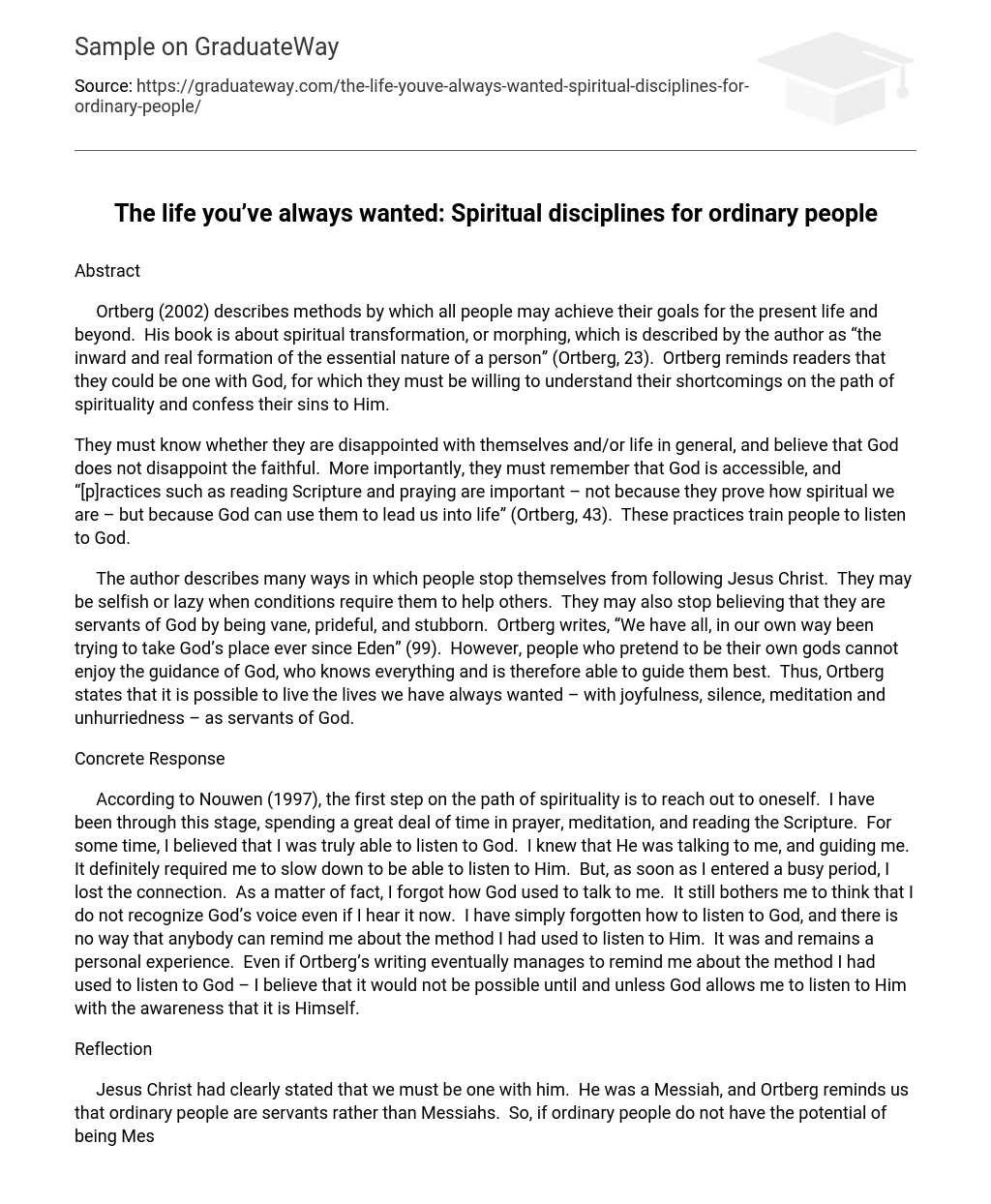Abstract
Ortberg (2002) describes methods by which all people may achieve their goals for the present life and beyond. His book is about spiritual transformation, or morphing, which is described by the author as “the inward and real formation of the essential nature of a person” (Ortberg, 23). Ortberg reminds readers that they could be one with God, for which they must be willing to understand their shortcomings on the path of spirituality and confess their sins to Him.
They must know whether they are disappointed with themselves and/or life in general, and believe that God does not disappoint the faithful. More importantly, they must remember that God is accessible, and “[p]ractices such as reading Scripture and praying are important – not because they prove how spiritual we are – but because God can use them to lead us into life” (Ortberg, 43). These practices train people to listen to God.
The author describes many ways in which people stop themselves from following Jesus Christ. They may be selfish or lazy when conditions require them to help others. They may also stop believing that they are servants of God by being vane, prideful, and stubborn. Ortberg writes, “We have all, in our own way been trying to take God’s place ever since Eden” (99). However, people who pretend to be their own gods cannot enjoy the guidance of God, who knows everything and is therefore able to guide them best. Thus, Ortberg states that it is possible to live the lives we have always wanted – with joyfulness, silence, meditation and unhurriedness – as servants of God.
Concrete Response
According to Nouwen (1997), the first step on the path of spirituality is to reach out to oneself. I have been through this stage, spending a great deal of time in prayer, meditation, and reading the Scripture. For some time, I believed that I was truly able to listen to God. I knew that He was talking to me, and guiding me. It definitely required me to slow down to be able to listen to Him. But, as soon as I entered a busy period, I lost the connection. As a matter of fact, I forgot how God used to talk to me. It still bothers me to think that I do not recognize God’s voice even if I hear it now. I have simply forgotten how to listen to God, and there is no way that anybody can remind me about the method I had used to listen to Him. It was and remains a personal experience. Even if Ortberg’s writing eventually manages to remind me about the method I had used to listen to God – I believe that it would not be possible until and unless God allows me to listen to Him with the awareness that it is Himself.
Reflection
Jesus Christ had clearly stated that we must be one with him. He was a Messiah, and Ortberg reminds us that ordinary people are servants rather than Messiahs. So, if ordinary people do not have the potential of being Messiahs, why did Jesus Christ say that we should be one with him?
Furthermore, Ortberg quotes William Iverson thus: “A pound of meat would surely be affected by a quarter pound of salt,” and adds, “If this is real Christianity, the ‘salt of the earth’ where is the effect of which Jesus spoke?” (Ostberg, 33). These words bother me, though I understand that Ortberg mentions this only because he has not been able to help our world the way Jesus is expected to. Almost everybody can talk. As far as results are concerned, I would not be able to give enough credit to Ortberg for changing our world. Perhaps, therefore, the author should spend more time in prayer, meditation, and reading the Scripture before he is actually able to influence the world in the manner of Jesus. In my opinion, people that are constantly talking about the Gospel instead of practicing it should reflect on their own spiritual disciplining process. In fact, all believers ought to practice as much as they preach.
Action
Jesus had stated that if we try to be one with him we may be able to do everything that he could do, and more. As I have always been interested in learning to heal and help, I can use this advice. McMinn (1996) suggests that counselors who practice their faith are easily able to build trust-based relationships with their clients. In other words, the counseling relationship reflects the faith of the counselor as part of his or her background (McMinn). So, if I have learned directly from Jesus, none of the other counseling techniques would work better. I would be a miracle counselor.
As mentioned before, I believe that I have lost the connection with God that I had experienced at the time I was genuinely motivated to be one with Him. I miss listening to Him, knowing that it is He. In the near future, therefore, I would like to spend more time in silence and prayer to start listening to Him again. Most importantly, this spiritual effort on my part would develop me as a patient counselor with perfect understanding of human problems and how to resolve them. After all, I would seek all solutions from God.
References
McMinn, M. R. (1996). Psychology, theology, and spirituality in Christian counseling. Carol
Stream, IL: Tyndale House Publishers.
Nouwen, H. J. M. (1997). Reaching out: The Three Movements of the Spiritual Life. New York:
Image Books.
Ortberg, J. (2002). The life you’ve always wanted: Spiritual disciplines for ordinary people.
Grand Rapids, MI: Zondervan Publishing Company.





